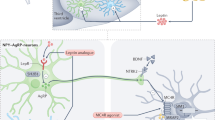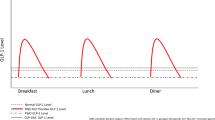Abstract
Homozygous or compound heterozygous melanocortin-4 receptor (MC4R) mutations are rare with fewer than 10 patients described in current literature. Here we report the short- and long-term outcomes for four children ages 4.5–14 who are homozygous for loss-of-function mutations in the MC4R and underwent laparoscopic sleeve gastrectomy. All four patients experienced significant weight loss and improvement in, or resolution of, their comorbidities in the short term. One patient, however, has had significant weight regain in the long term. We conclude that MC4R signaling is not required for short-term weight loss after laparoscopic sleeve gastrectomy in children. Behavior modification may be more important for long-term weight maintenance, but patients with homozygous MC4R deficiency should not be excluded from consideration for sleeve gastrectomy. However, as at least one copy of functional MC4R is necessary and sufficient to induce long-term postoperative weight loss benefits, patients with complete loss of MC4R functionality might be less likely to exhibit the same benefits resulting from bariatric surgery.
This is a preview of subscription content, access via your institution
Access options
Subscribe to this journal
Receive 12 print issues and online access
$259.00 per year
only $21.58 per issue
Buy this article
- Purchase on Springer Link
- Instant access to full article PDF
Prices may be subject to local taxes which are calculated during checkout


Similar content being viewed by others
References
Ogden CL, Carroll MD, Curtin LR, McDowell MA, Tabak CJ, Flegal KM . Prevalence of overweight and obesity in the United States, 1999–2004. JAMA 2006; 295: 1549–1555.
Cawley J, Meyerhoefer C . The medical care costs of obesity: an instrumental variables approach. J Health Econ 2012; 31: 219–230.
Censani M, Conroy R, Deng L, Oberfield SE, McMahon DJ, Zitsman JL et al. Weight loss after bariatric surgery in morbidly obese adolescents with MC4R mutations. Obesity 2014; 22: 225–231.
Nadler EP, Barefoot LC, Qureshi FG . Early results after laparoscopic sleeve gastrectomy in adolescents with morbid obesity. Surgery 2012; 152: 212–217.
Nadler EP, Reddy S, Isenalumhe A, Youn HA, Peck V, Ren CJ et al. Laparoscopic adjustable gastric banding for morbidly obese adolescents affects android fat loss, resolution of comorbidities, and improved metabolic status. J Am Coll Surg 2009; 209: 638–644.
O’Brien PE, Sawyer SM, Laurie C, Brown WA, Skinner S, Veit F et al. Laparoscopic adjustable gastric banding in severely obese adolescents: a randomized trial. JAMA 2010; 303: 519–526.
Dolan K, Creighton L, Hopkins G, Fielding G . Laparoscopic gastric banding in morbidly obese adolescents. Obes Surg 2003; 13: 101–104.
Nadler EP, Youn HA, Ren CJ, Fielding GA . An update on 73 US obese pediatric patients treated with laparoscopic adjustable gastric banding: comorbidity resolution and compliance data. J Pediatr Surg 2008; 43: 141–146.
Ingelfinger JR . Bariatric Surgery in Adolescents. N Engl J Med 2011; 365: 1365–1367.
Farrell TM, Haggerty SP, Overby DW, Kohn GP, Richardson WS, Fanelli RD . Clinical application of laparoscopic bariatric surgery: an evidence-based review. Surg Endosc 2009; 23: 930–949.
Buchwald H, Avidor Y, Braunwald E, Jensen MD, Pories W, Fahrbach K et al. Bariatric surgery: a systematic review and meta-analysis. JAMA 2004; 292: 1724–1737.
Kendrick ML, Dakin GF . Surgical approaches to obesity. Mayo Clin Proc 2006; 81: S18–S24.
Alqahtani AR, Antonisamy B, Alamri H, Elahmedi M, Zimmerman VA . Laparoscopic sleeve gastrectomy in 108 obese children and adolescents aged 5 to 21 years. Ann Surg 2012; 256: 266–273.
Aslan IR, Ranadive SA, Ersoy BA, Rogers SJ, Lustig RH, Vaisse C . Bariatric surgery in a patient with complete MC4R deficiency. Int J Obes (Lond) 2011; 35: 457–461.
Lubrano-Berthelier C, Cavazos M, Dubern B, Shapiro A, Stunff CLE, Zhang S et al. Molecular genetics of human obesity-associated MC4R mutations. Ann N Y Acad Sci 2003; 994: 49–57.
Farooqi IS, Yeo GS, Keogh JM, Aminian S, Jebb SA, Butler G et al. Dominant and recessive inheritance of morbid obesity associated with melanocortin 4 receptor deficiency. J Clin Invest 2000; 106: 271–279.
Hatoum IJ, Stylopoulos N, Vanhoose AM, Boyd KL, Yin DP, Ellacott KLJ et al. Melanocortin-4 receptor signaling is required for weight loss after gastric bypass surgery. J Clin Endocrinol Metab 2012; 97: E1023–E1031.
Mul JD, Begg DP, Alsters SIM, Haaften GV, Duran KJ, D’Alessio DA et al. Effect of vertical sleeve gastrectomy in melanocortin receptor 4-deficient rats. AJP. Endocrinol Metab 2012; 303: E103–E110.
Tan K, Pogozheva ID, Yeo GSH, Hadaschik D, Keogh JM, Haskell-Leuvano C et al. Functional characterization and structural modeling of obesity associated mutations in the melanocortin 4 receptor. Endocrinology 2009; 150: 114–125.
Chung WK . An overview of mongenic and syndromic obesities in humans. Pediatr Blood Cancer 2012; 58: 122–128.
Stefater MA, Wilson-Pérez HE, Chambers AP, Sandoval DA, Seeley RJ . All bariatric surgeries are not created equal: Insights from mechanistic comparisons. Endocr Rev 2012; 33: 595–622.
Peterli R, Wölnerhanssen B, Peters T, Devaux N, Kern B, Christoffel-Courtin C et al. Improvement in glucose metabolism after bariatric surgery: comparison of laparoscopic Roux-en-Y gastric bypass and laparoscopic sleeve gastrectomy: a prospective randomized trial. Ann Surg 2009; 250: 234–241.
Turton MD, O’Shea D, Gunn I, Beak SA, Edwards CM, Meeran K et al. A role for glucagon-like peptide-1 in the central regulation of feeding. Nature 1996; 379: 69–72.
Kelly A, Rudser K, Nathan B, Fox C, Metzig A, Coombes B, Fitch A, Bomberg EM, Abuzzahab MJ . The effect of glucagon-like peptide-1 receptor agonist therapy on body mass index in adolescents with severe obesity: a randomized, placebo-controlled, clinical trial. JAMA Pediatr 2013; 167: 355–360.
Bode B . Liraglutide: a review of the first once-daily GLP-1 receptor agonist. Am J Manag Care 2011; 17: S59–S70.
René P, Le Gouill C, Pogozheva ID, Lee G, Mosberg HI, Farooqi IS et al. Pharmacological chaperones restore function to MC4R mutants responsible for severe early-onset obesity. J Pharmacol Exp Ther 2010; 335: 520–532.
Wang X-H, Wang H-M, Zhao B-L, Yu P, Fan Z-C . Rescue of the mutant MC4R cell surface expression and signaling by a novel pharmacoperone Ipsen 17. J Mol Endocrinol 2014; 53: 17–29.
Author information
Authors and Affiliations
Corresponding author
Ethics declarations
Competing interests
The authors declare no conflict of interest.
Rights and permissions
About this article
Cite this article
Jelin, E., Daggag, H., Speer, A. et al. Melanocortin-4 receptor signaling is not required for short-term weight loss after sleeve gastrectomy in pediatric patients. Int J Obes 40, 550–553 (2016). https://doi.org/10.1038/ijo.2015.230
Received:
Revised:
Accepted:
Published:
Issue Date:
DOI: https://doi.org/10.1038/ijo.2015.230
This article is cited by
-
Long-Term Weight Outcome After Bariatric Surgery in Patients with Melanocortin-4 Receptor Gene Variants: a Case–Control Study of 105 Patients
Obesity Surgery (2022)
-
Effects of Heterozygous Variants in the Leptin-Melanocortin Pathway on Roux-en-Y Gastric Bypass Outcomes: a 15-Year Case–Control Study
Obesity Surgery (2022)
-
Bariatric Surgery for Monogenic Non-syndromic and Syndromic Obesity Disorders
Current Diabetes Reports (2020)
-
Adolescent Bariatric Surgery: Current Concepts and Future Directions
Current Surgery Reports (2019)
-
Updates on Monogenic Obesity in a Multifactorial Disease
Obesity Surgery (2019)



